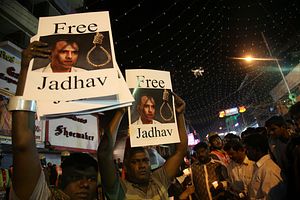The International Court of Justice (ICJ) is expected to announce its verdict in Kulbushan Jadhav’s case on July 17. Jadhav, an Indian national and a retired navy officer, was arrested by Pakistan in the country’s Balochistan province in 2016. The verdict is important for both countries as it will carry significant implications for New Delhi and Islamabad’s stance on the issue and their relationship.
In 2017, Pakistan’s military courts incriminated Jadhav with terrorism and espionage charges, and sentenced him to death. Pakistan was unable to carry out the death sentence after India approached the ICJ for mediation in the case. The case’s nature has remained very complicated with both India and Pakistan bringing to table arguments that have challenged the court’s ability to pass a decisive judgment. For instance, India has maintained that Islamabad violated the Vienna Convention on Consular Relations as the country didn’t allow consular access to Jadhav. Article 36 of the Vienna Convention states that “foreign nationals who are arrested or detained be given notice without delay of their right to have their embassy or consulate notified of that arrest.”
Pakistan, on the other hand, has challenged New Delhi’s entire stance at ICJ concerning the relevance of the Vienna Convention in the case. In this regard, Pakistan’s main argument is that Jadhav is an Indian spy who illegally entered Pakistan to sabotage the country’s interests and therefore he was not permitted consular access. Islamabad also maintains that New Delhi is using the court as political theater as it didn’t have anything substantial to present in the case to challenge Pakistan’s view.
In this situation, it’s going to be very tough for the court to decide the case in a manner whereby neither India nor Pakistan object to its verdict. The history of Pakistan and India’s legal battles at the ICJ shows that the court has refrained from passing judgments that could be seen as one-sided or overtly undermining the interests of one country. So far, Pakistan and India have taken three cases to the ICJ and the verdict in all trials have been very telling.
For instance, in a case related to the prisoners of war in 1971, India objected to the court’s jurisdiction and the case was ultimately decided between India and Pakistan. Pakistan, as the primary party in the case, informed the court that both countries had resolved the case bilaterally and requested the ICJ to discontinue the proceedings. In another case in 1999, involving India’s downing of a Pakistani jet, the court maintained that it did not have jurisdiction to deal with the issue and no decision was made by the ICJ.
In this context, it is expected that the upcoming verdict in Jadhav’s case is going to be one that offers both countries some space to drive the outcome in their support domestically and internationally. It’s unlikely that the ICJ will ask Pakistan to release Jadhav or dismiss India’s objections completely. Hypothetically, even if the ICJ were to entertain India’s defense and ask Pakistan to release Jadhav, Islamabad is unlikely to comply with such a decision as any such decision would surely undermine the authenticity of Pakistan’s case. Islamabad should not be expected to release Jadhav as that may leave domestic implications for the country’s current government. However, any decision that remains short of asking Pakistan for the release of Jadhav will likely be accepted by Islamabad. The forum is likely to ask Islamabad to allow consular access to the accused and restrain the country from carrying out the death sentence.
Similarly, in India’s case, any decision that approves Jadhav’s role as a suspect working for the Indian intelligence agencies is not going to be accepted by New Delhi as that will involve the state’s role in the confrontation.
It’s important to note that while ICJ’s rulings are obligatory, the court’s verdicts have not always been approved by the member states. In that context, regardless of what the court decides, the fate of Jadhav depends on the nature of India and Pakistan’s bilateral relationship.
































